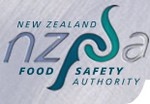Survey provides insight into consumers' thinking
Results of a survey on the perceptions of food safety in New Zealand suggest that more than half (53%) of all those questioned believe food safety standards have improved during the past few years.
A quantitative study, carried out by UMR Research in July on behalf of the New Zealand Food Safety Authority (NZFSA) also reveals that the number of people studying ingredient labels has risen to 58% – that's 10% more than those questioned in the original survey carried out in 2002. The survey is the third undertaken for NZFSA since that time, and shows a number of interesting trends.
While most respondents (85%), cited chicken as a primary food safety concern, 95% said they were aware of the need for special care when cooking and handling poultry and always checked to ensure such meat had been cooked properly before eating it. Similarly, 9 out of 10 said they always followed the 4Cs (clean, cook, cover, chill) rules when handling poultry.
"These results demonstrate that virtually all Kiwis are successfully applying our food safety messages in the home which is good news for us, for them – and their families," says Sandra Daly, Deputy Chief Executive of NZFSA.
Elsewhere in the survey 91% of respondents said they would like food outlets to clearly display their hygiene ratings and there was solid support for labelling initiatives, such as 'free of added hormones'.
Overall, three-quarters of respondents cited Salmonella as a food safety issue that most concerned them; 67% identified antibiotics in meat and 63% said Campylobacter.
The number of respondents concerned about the use of pesticides to grow food, and genetically modified foods, remained consistent at 62% and 56% respectively, compared with 63% and 57% in 2005.
Ms Daly said: "Interestingly, the survey also showed us that though 42% of respondents believe government regulations on food handling practices at fund-raising barbeques or food stalls would be 'over the top' 81% say that they would expect the same level of food safety at a fund-raising dinner as they would at any other commercial outlet.
"We are well aware that these fund-raising events are very much a part of the Kiwi way of life. Consequently our plan to introduce food handler guidance material for fund-raising organisers as part of the legislation currently being drafted for the new Food Bill, will ensure any risks to consumers at these events are managed in a proportionate way," she says.
The survey results, which overall are similar to those in the last UMR survey carried out in 2005, are based on a nationally representative random telephone survey of 750 New Zealanders, aged 18 and over. It was conducted throughout June and July this year. The margin of error for a 50% figure at the 95% confidence level is +/-3.6%. The survey is available on NZFSA's website at: http://www.nzfsa.govt.nz/consumers/food-safety-topics/consumer-surveys/index.htm
Ends
